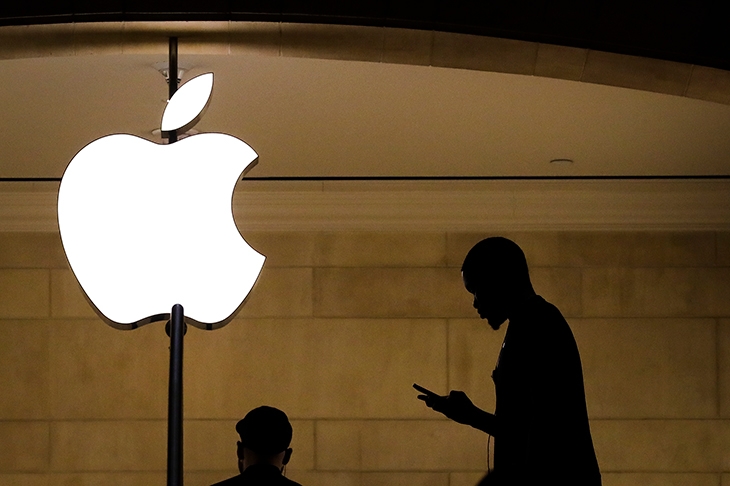A few weeks ago, more than 2,000 employees of Apple Inc. signed a petition that led to the sacking of a clever and capable tech engineer, Antonio García Martínez. García Martínez was fired for sexism — not because he behaved badly towards any women, but because of a passage in a book he wrote five years ago. The book was Chaos Monkeys, an exposé of the Silicon Valley scene, and here’s the offending sentence: ‘Most women in the Bay Area are soft and weak, cosseted and naive despite their claims of worldliness, and generally full of shit…but the reality is, come the epidemic plague or a foreign invasion, they’d become precisely the sort of useless baggage you’d trade for a box of shotgun shells or a jerry can of diesel.’
Chaos Monkeys was a New York Times bestseller — funny, confessional and pacy. Everyone at Apple who welcomed Antonio on board would have read it. No one took issue with the book when he was hired, but a week after he started the poisoned petition began to circulate: ‘We are deeply concerned about the recent hiring of Antonio García Martínez,’ it read. ‘His misogynistic statements…directly oppose Apple’s commitment to Inclusion and Diversity. We are profoundly distraught by what this hire means for Apple’s commitment to inclusion goals as well as its real and immediate impact on those working near Mr García Martínez.’
Did Apple defend García Martínez? Of course it didn’t. Apple crumbled. Victory for Bay Area Woman. But was it really a win for women? No. It wasn’t. I reckon it set back the feminist cause decades. And were the petitioners really women? I’m not so sure. This was a new low for American cancel culture, and the best explanation I can think of is that, for the most part, the petitioners were men. It’s not that I dislike men or imagine them stupid. It’s just that I’ve come to think that people are sometimes most blinkered and most vicious when they’re rallying to a cause that’s not their own. Ally syndrome let’s call it. Allies are often more merciless because the wrong isn’t theirs to forgive.
Or perhaps I simply don’t want to believe that women can be so dim. If the petition really was signed by women, in defense of women, then somewhere along the way feminism’s done a nosedive. If you read the contentious sentence in context (and God forgive those petitioners if they didn’t), it is in fact not an attack, but a love letter to García Martínez’s then girlfriend. Bay Area Woman is simply there to provide dramatic contrast; to show how relatively tough and capable the girlfriend is.
But apart from her physical ineptitude, where is Bay Area Woman’s brain? You just can’t complain that a man is perpetuating a sexist stereotype of women as wimpy, and then hyperventilate about the thought of sitting next to him. Or if you do, you’re literally proving his point — and that’s not a millennial ‘literally’, as in ‘literally unsafe’ or ‘literally killing people’ by insulting them on Twitter. It’s straight-up, old-fashioned literally true. It absolutely beats me why these 21st-century women so hellbent on progress conform so readily to patriarchal stereotypes, fainting away at any whiff of offense. Perhaps Apple should stock smelling salts beside the hand gel dispensers.
‘Given Mr García Martínez’s history of publishing overtly racist and sexist remarks,’ the petition went on, ‘we are concerned that his presence at Apple will contribute to an unsafe working environment for our colleagues who are at risk of public harassment and private bullying.’
What is the truth here? Would a girl be unsafe sitting next to Antonio García Martínez? The only evidence the petitioners present is from Chaos Monkeys, but I’ve scoured it for misogyny, and found so little it’s almost disappointing. García Martínez is a workaholic tech nerd. Throughout the book he has one long-term romance and behaves, I’d say, in an exemplary way. For instance: when the tough-nut girlfriend discovers she is pregnant, García Martínez sticks with her and agrees to be a father. He does it although he doesn’t himself want a child, because he knows how much the toughie wants one. Are you listening, Bay Area Woman? How many of you have been ghosted by men with all the right views on gender or, say, Palestine? Don’t actions speak louder than words?
There’s a bit of advice buried in Chaos Monkeys that Bay Area girls might find handy: ‘Unlike maniacal focus, though, which is a personality trait too difficult to mould once in adulthood, this thing — call it grit, perseverance, or whatever — is something that can be learned,’ writes García Martínez. ‘If you feel you don’t possess that strength within you, then go ride a bicycle across the United States, sail a boat across an ocean, or join the Marines. Whatever it takes to build those reserves of mental endurance.’
What I find so particularly annoying about the affair is that it brings back a memory of a comparable situation, in which men behaved as I wish these women would. Nearly 20 years ago, when I arrived at The Spectator, a young Canadian writer called Leah McLaren submitted an article about the deficiencies of English men, which was in some ways an echo of that passage in Chaos Monkeys. Leah had been dating a selection of Hugh Grant types, West London Man as I remember, and she was scathing: ‘Since moving to London, my romantic life has been characterized by last-minute text messages, incomprehensible drunkards, first-date coke-bingers and split bar tabs. I quickly learnt that if you let an English man pay, you’ll have to listen to him whine about it later.’ Her conclusion was many English men were emotionally stunted, borderline alcoholic, misogynist and probably secretly gay.
Did the men of The Spectator rise up in outrage? Did they feel triggered and demand Leah piece’s hit the spike? Nope. The piece went on the cover and Boris Johnson, then the editor, invited Leah to lunch.
This article was originally published in The Spectator’s UK magazine. Subscribe to the World edition here.

























